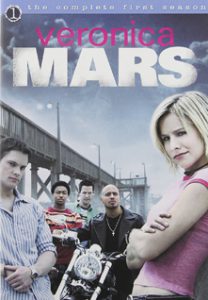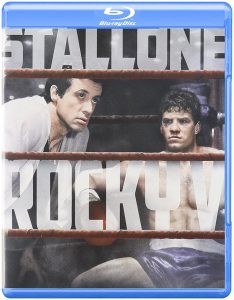The “Rocky” films never drifted into the arena of spectacle as much as their reputation suggests. Even the most over-the-top entry, “Rocky IV,” includes acknowledgements of the heightened plot, like when the commentators note the bizarreness of the Creed-Drago match. Still, the larger-than-life villainy of Clubber Lang and Ivan Drago changed the perception of the series, and “Rocky V”(1990) seems to be a calculated reaction to that, as writer Sylvester Stallone aggressively brings the series back to its roots.
The 5.1 rating on IMDB — the lowest of the six films — suggests fans didn’t like the change, but I find it to be underrated, as it is effective at showing the mean streets of north Philly and the cruel side of the boxing world. “Rocky V” is imperfect and it culminates with a tone-deaf ending, but if it’s to be judged failure, at least it’s a noble one. I find it of similar quality to the much more heralded “Rocky II” – flawed, but propelled by the fact that we’re learning about the next step in the lives of people we’ve grown to love.
First, the good things. This is the best-looking entry since the original, with the perpetually wet pavement, steam coming out of the storm drains and dust flying off the old punching bag in Mick’s gym. The first film’s helmer, John G. Avildsen, returns to the director’s chair and Steven Poster is the new cinematographer. But frankly, the success could be chalked up to shooting in north Philly again. In parts II through IV, Rocky lived in a posh south Philly neighborhood, but after the Balboas get swindled in a bad financial deal, they lose their fortune and move back to the ol’ hood.
The exteriors of their new home look like Paulie’s old house, although the interior is different. The warm hominess is palpable, from the crowded Christmas-decorated living room to the man cave in the basement where the family gathers to watch the Gunn-Cane bout.
Although he is briefly seen in parts III and IV played by different actors, we get to know Rocky Jr. (Stallone’s son, Sage) for the first time in “Rocky V.” He loves drawing, not boxing, but mainly he desperately wants his father’s attention. I like how Junior learns a few basic moves at Mick’s gym – which Rocky now owns and operates – so he can finally punch out his school tormenter, and then he immediately becomes friends with the bully. The streets of Philadelphia are cruel, but there is an underlying logic to how they operate; brawn is essential, but brains have value, too. Some film series jump the shark when a kid becomes a main character, but that’s not the case in “Rocky V,” as Sage Stallone holds his own and has great on-screen chemistry with Sly. (Unlike Junior, Sage actually did follow in his father’s footsteps as an actor. Tragically, his career and life were cut short when he died of a heart attack in 2012 at age 36.)

Adrian, on the other hand, gets short shrift. The “Rocky” films have always been unabashed guy’s movies – the series scores lower on the Bechtdel Test than Rocky would on an IQ test – and that’s fine (everything need not appeal to everyone), but it’s still ridiculous how little Adrian is explored.
The series never gives Adrian any interests outside of her love for Rocky, and not even Rocky Jr. becomes one of those interests. Heck, when Rocky gets off the plane from Moscow and asks where his son is, Adrian says she doesn’t know. “Rocky V” should’ve had at least one mother-and-son scene to better illustrate why she can’t get through to Rocky Jr. either (It’s clear why Rocky is failing: He is blowing off his son to train up-and-comer Tommy Gunn.) Doing yeoman’s work, Talia Shire is also asked to play ridiculous contradictions: She wisely wants Rocky to retire from boxing, yet after he potentially risks further brain damage and death by fighting Tommy in the streets, she hugs him and smiles like she’s taken a time-machine back 15 years. Adrian should be furious at her husband, and possibly even ask for a divorce.
Despite Rocky apparently escaping further health problems after receiving bare-knuckled blows from the world heavyweight champion, “Rocky V” at least deserves credit for addressing the dangers of boxing, a theme that was ignored in III and IV. A reporter brings up the suggestion that boxing should be banned. I don’t believe in banning any voluntary activities, but I can understand the desire to discourage people from sports like boxing, football and MMA. (Rocky doesn’t think it should be banned, but it’s unclear if he’s anti-banning-stuff or pro-boxing.)
Honestly, though, retirement isn’t a bad thing for Rocky. He obviously enjoys training young boxers. And Rocky is one helluva trainer: As he climbs to 23-0 and wins the title belt, Gunn earns the nickname The Clone Ranger for having a fighting style like Balboa’s.
Moving away from the cartoonish styles of Clubber and Drago, “Rocky V” features more grounded boxing scenes, the result of casting real-life boxer Tommy Morrison as Gunn. Like his fictional character, Morrison was himself a 23-0 up-and-comer at the time of the film’s shooting. (He would go on to hold two world heavyweight titles in a career — and ultimately, life — that was cut short because of AIDS. He died in 2013 at age 44.)
“Rocky V” seeks to explore the shady side of professional boxing, a theme that was dropped from early drafts of “Rocky.” In this sense, “Rocky V” is a bit too blunt. While Richard Gant does a flawless Don King impression as the promoter George Washington Duke, it gets too silly in the final act when he keeps telling Rocky “You touch me and I’ll sue” and then Rocky dutifully completes the ridiculous setup by punching him out. The boxing reporters mercilessly ripping into Gunn in the post-fight news conference also drifts into self-parody. (If a viewer wants to be generous, “Rocky V” can be read as a commentary on how real-world boxing got shallower in the years since the original film’s release, with people like King and the media contributing to the shallowness.)
Duke (not to be confused with Apollo’s and Rocky’s trainer of the same name) is supposed to be the anti-Mickey. In addition to training Rocky, Mickey was also his manager, and we learned in “Rocky III” that he skillfully scheduled 10 title defenses that Rocky could win without undue risk of endangering his health. And since the media loved Rocky, they didn’t hound him about ducking serious challengers. To drive home Mickey’s caring nature, Burgess Meredith returns for a touching flashback scene where he drops the almost parodic performance of “Rocky II’s” training scenes and tenderly gives Rocky a cufflink that was given to him by Rocky Marciano.
Gunn, however, doesn’t need to be protected. Gunn accepts the Duke-promoted title bout without consulting with Rocky, and wins convincingly over Union Cane. In turns out, he was indeed ready – as a fighter. He’s not a mature human being yet, though, and it’s why the final act of “Rocky V” is frustrating.
A couple of twists follow Gunn’s achievement in the ring. First, we learn that Duke wanted to maneuver Gunn into winning the title so the media would transfer its disgust with Cane’s paper title to Gunn’s paper title. (Rocky vacated the title when he retired.) Then Duke could set up Balboa versus Gunn, teacher versus student, and make a boatload of money. Second, Gunn is not satisfied with officially being the champion; he wants to prove he’s the best by beating the best. This is not necessarily a bad trait – in fact, he has this in common with Rocky and the late Apollo.
Originally quite respectful to Rocky and recent boxing history, Gunn devolves into a man-child as the narrative progresses; his flaw is that he cares deeply about what other people think of him. Still, he’s the champion and he’s rich, and without his need for immediate gratification being teased out by Duke, Gunn quite possibly would’ve told Duke to take a hike and given Rocky a big ol’ hug. He could make an honest case to the media that it’s not his fault that Balboa won’t fight him for the title; he has legitimately earned it under the rules of the sport. (Besides, if he did defeat Rocky, you know those jackals in the media would say Rocky was over the hill.)
So when Gunn punches Pauley (who deserved to be punched many times in this series, but not this time) — and then pretty much everyone else in north Philly — before getting pounded into the ground by Rocky, I feel like saying “Just leave it alone, kid! Go home and enjoy your success!” That might be another reason why people don’t like “Rocky V”: The conflict is predicated on Gunn being too stupid to see how Duke is pulling his strings. Rocky giving Gunn the what-for is not satisfying, it’s sad.
Another reason why the ending doesn’t jell is that it recasts Rocky as a street brawler without having earned it beyond the vague notion that he grew up in north Philly and attended the same school Rocky Jr. is at now. When Junior beats up the bully, is that supposed to be a parallel to Senior doing the same thing back in his day? If so, the connection is tenuous. At this point in the saga, we haven’t learned the precise backstory of how Rocky got into boxing in the first place, but I had subconsciously pegged Rocky as the type to fight in the streets or schoolyard only as a last resort. He would use his big and bruising visage as a way to discourage fights in the first place; this no doubt made him a decent loan collector initially, before borrowers got wise that Rocky was a softie at heart. I imagine Rocky sought out organized boxing on his own and learned his skills at Mick’s gym. Gunn, on the other hand, definitely is a self-taught brawler – the first man he knocked out was his abusive father, in their home.
In a film series where characters learn from their mistakes (albeit slowly, at times), “Rocky V” ends on a sour note because Tommy – who has the potential to mirror Rocky not just as a boxer but as a man – has his strings so easily pulled by cartoonish villain Duke. When Rocky punches out Tommy in the streets, it’s a cue for the standard swelling music and celebration, but it shouldn’t be.
Rocky monumentally backslides in the final act. He has utterly failed in his attempt at being a mentor to Gunn. He betrays Adrian’s trust that he won’t fight anymore by getting into the most dangerous fisticuffs imaginable – against the world heavyweight champion, without pads, on pavement, without doctors nearby. As icing on the cake, he gives in to his anger and punches the smarmy promoter (and frankly, he probably will get sued for assault and hurt his family’s finances even more). “Rocky V” is the first film since the original where Rocky loses, and the only one where he loses in ignoble fashion, but it seems the filmmakers don’t realize it.
More “Rocky”/”Creed” reviews:

